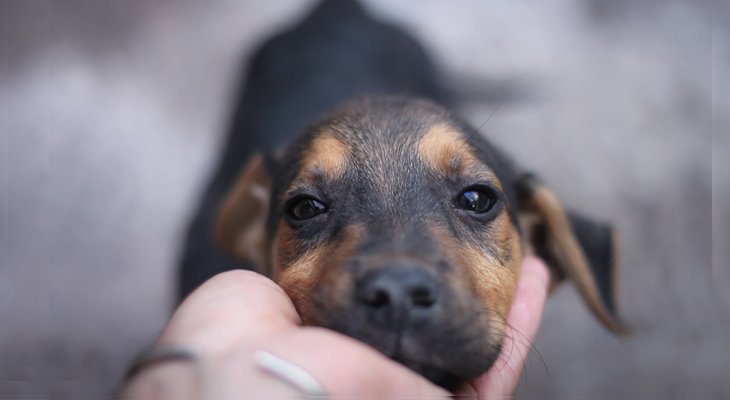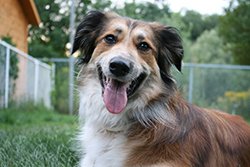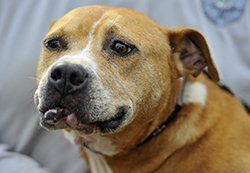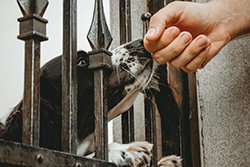
Whiledogs can be animated creatures, they’re not always able to communicate what they’re feeling. They have to rely on physical and audible cues to let you know what’s going on.
One of the most alarming things you may witness your dog doing is chattering their teeth.
Chattering can be as minor as abrupt jaw movements.
In more serious cases, the chattering may be so bad that you can hear your dog’s teeth hitting one another.
Teeth chatteringis something that we humans often associate with being cold. When a dog does it, the action could mean a number of things.
* Uncontrollable teeth chattering is a symptom of some other underlying issue. It’s important that you get to the bottom of the problem as soon as possible.
Serious chattering can result in tooth damage if it’s not addressed. Not only that, but the action could be a cry for help. Here are some common reasons why your dog may be chattering his or her teeth.
Dog Teeth Chattering, What Does It Mean?
#1. Cold Temperatures
If you notice your dog chattering teeth and shaking/shivering, the culprit could be something as simple as cold temperatures in your home.
Smaller dogs and those with short fur are more susceptible to temperature changes that us humans.
Your dog is simply reacting to what their feeling. It’s an automatic response that all dogs can experience. The body goes into defense mode.
The involuntary movements are meant to generate heat so that your pup can achieve some comfort.
The simplest solution to this problem would be to give your pup something warm to cuddle in. If the problem persists, your dog may have a fever.
#2. Old Age
Dogs can act a lot like humans when they get older.
Their bodies just start to develop weird ticks. It’s similar to the tooth sucking or lip smacking we see in humans. If there’s no other discernible cause, it just may be a product of getting older.
It’s a good idea to keep an eye out on your dog.
You should make sure that there are no other physical signs of something wrong before you chalk it up to your pup reaching their golden years.
#3. Happiness

Sometimes, dogs simply can’t contain their excitement. Their positive emotions can easily manifest themselves as teeth chattering.
You may notice that your dog does this after you get home from work or whenever they start playing with their favorite toy.
The act is simply a way for your dog to get their emotions out. You may see other signs of happiness as well, such as tail wagging and hopping. If this is the case, there’s no serious cause for concern.
However, if their chattering starts to affect their teeth, you may want to visit a veterinarian or professional trainer to see if you can teach your dog how to focus their excitement on something a bit less damaging.
#4. Anticipation and Excitement
This cause is a bit similar to happiness but usually occurs when the dog is expecting something.
You may notice that your dog usually starts chattering away when you’re preparing their food bowl or gathering their leash for a walk. It’s a simple emotional reaction.
Often times, chattering is accompanied by a number of other actions.
They may start to wag their tail or wiggle their behinds trying to keep themselves contained.
Some owners may also notice that their dog’s jaws start moving when they’re told a command. For example, you may tell your pup to sit while you’re preparing the walking leash.
They’ll listen to you because they know it’s the right thing to do. However, all of that anticipation for what’s to come leads to some uncontrollable chattering.
#5. Anxiety or Stress
Your dog may start chattering when they’re on the other end of the emotional spectrum as well. While we love to view our dogs as simple creatures without a care in the world,
canine stress and anxiety is a very real thing.
In this case, your dog may not be able to process what they’re feeling. Chattering becomes somewhat of a coping mechanism to help them control their emotions.
When your dog is feeling stress, you need to address the underlying cause. There are many reasons why your pup may be feeling these things.
They may get upset because you’re not around. Sometimes, dogs get stressed because of the action of other dogs.
Whatever the case may be, it’s important that you find a solution as soon as possible. Stress can lead to potentially destructive behavioral issues the longer it goes on.
#6. Physical Pain

Pain is another cause that you need to be wary of. Typically, body reactions from pain are close to where the injury is.
If you notice your dog’s teeth chattering after yawning, it could be a sign that they’re experiencing dental problems. They may have cracked teeth, swelling, or a small sore.
Your furry friend may even be suffering from periodontal disease.
It’s recommended that you take your pooch to the vet as soon as possible.
While you may be tempted to look into your dog’s mouth yourself, there’s a very real chance that your canine companion may bite you. A vet will be able to take a closer look, diagnose the issue, and provide a solution.
#7. Focal Motor Seizures
Focal motor seizures are a unique condition that’s difficult to spot.
They’re not like standard seizures that affect the entire body. Instead, the problem is localized. They’re caused by abnormal electrical activity in one part of the brain.
Dogs will often feel pressure in their jaw. As a result, they bite down. The seizure then causes the jaw to move erratically, resulting in chattering.
Dog chattering teeth and drooling could be an indicator that focal motor seizures are to blame. During the seizure, they lose control of their mouth and tongue.
It’s imperative that you seek professional care as soon as possible. A veterinarian may be able to provide a treatment that keeps the issue under control.
#8. Epilepsy
Epilepsy can cause more significant seizures. Dogs that suffer from the condition can be triggered by a number of things.
Seizures can be caused by bright lights, sudden sounds, and a number of other triggers. This is often accompanied by facial twitches and difficulty breathing. Your dog’s mouth may also start to foam.
If your dog has been diagnosed with epilepsy prior to these episodes, you need to monitor the length of the seizure. Seizures that last for more than five minutes will require veterinarian attention.
If your dog hasn’t been diagnosed, you need to have your vet examine the issue.
Epilepsy is a very serious condition that can affect their daily lives. However, there are ways to treat it. The first step is to seek help.
#9. White Dog Shaker Syndrome
There isn’t much known about White Dog Shaker Syndrome. It can affect dogs very suddenly and get worse over the course of a few days.
The chattering is typically accompanied by body shaking, involuntary eye movements, difficulty walking, and a number of other symptoms.
The condition was first noticed in small white dogs. However, it can affect many different breeds. Not only that, but it can affect both young puppies and adult dogs.
Some professionals believe that the issues are caused by brain swelling. Unfortunately, there’s no clear answer at the moment.
There are some treatment options.
One of the most common is the use of benzodiazepines. However, symptoms can come back at any time. It’s a condition that you’re going to have to help your dog manage.
#10. Hormones
Male dogs can start chattering their teeth because they cause a whiff of a female in heat.
The pheromones produced by the female can send your dog in a tizzy. Even neutered dogs can respond to the hormones.
Because of your dog’s amazing sense of smell, you may not even see the female dog nearby. What if he keeps chattering?
If the action doesn’t stop within a few moments,
hold on to your dog’s leash. Male dogs will try their best to dart to the female once they have her scent.
You may have a hard time getting your dog to listen to you, so the best solution is to remove you and your dog from the situation and get as far away from the female as possible.
#11. Stimulated Senses

Sometimes, dog teeth chattering starts after smelling or tasting something unique. Dogs rely heavily on their senses of smell and taste.
When something new and exciting comes along, they can get excited. The chattering is involuntary.
You may notice that they’re using their nose to try to find more of whatever they tasted or smelled. It’s as if they’re trying to bite for it.
This cause is innocent enough and will usually subside after they lose track of whatever the amazing thing was.
#12. Multisystem Neuronal Degeneration
Multisystem neuronal degeneration is very similar to White Dog Shaker Syndrome.
As the name implies, it can affect various parts of your dog’s body. In addition to causing their teeth to chatter, you may see a sharp decline in cognitive function.
* Dogs can also experience balance issues and difficulty walking.
This condition is a hereditary problem that affects dogs at a young age. You may notice symptoms as early as one year old.
While it can affect a wide variety of breeds, it’s most prevalent in Cocker Spaniels, Bichons, and Malteses.
There is no known cure for multisystem neuronal degeneration. However, your veterinarian may be able to recommend treatment options that help you manage symptoms effectively.
#13. Dreaming
If your dog’s teeth chattering starts during sleep, they may be having a very vivid dream.
While most people don’t realize it, dogs are fully capable of having imaginative dreams like us humans. Humans move and talk in their sleep, so why can’t dogs?
One of the most common things that dogs do in their sleep is kicking. This is thought to be connected to dreams of chasing prey. Chattering may be connected to dreams of eating or barking.
Example of a Corgi puppy chattering his teeth during sleep.
If this starts to happen, the best thing you can do islet your dog’s dream play out.
Typically, the activity will stop after a few moments. Don’t try to wake your dog up. It’s not uncommon for dogs to bite their owners after being woken up abruptly.
#14. Safety Mechanism
Some dogs use teeth chattering as a defense mechanism when they’re faced with a possible threat.
This is very common in smaller dogs. The threat may be another dog or a human. Either way, they use the chattering in hopes of causing a distraction.
It’s often used alongside other methods, such as spinning around.
The goal of these distractions is to make the potential threat forget about causing harm.
Alternatively, your dog may be used to seem more threatening.
Some dogs use this tactic to cause confusion and fear in other dogs. This is especially true if your dog doesn’t have a particularly threatening bark.
#15. Canine Parkinson’s Disease
Parkinson’s Disease is a condition that affects humans. It causes involuntary movements and affects motor control. These issues stem from problems within the central nervous system.
Dogs can also suffer from Parkinson’s Disease.
If your dog suffers from the condition, they may experience stiffness in their legs. This results in balance issues and difficulty walking. It can also affect other parts of the body, such as the jaw and face.
The main difference between human Parkinson’s Disease and the canine version is age. For canine’s the condition is hereditary. It’s similar to other neurological issues.
Symptoms may start to occur early on in a dog’s life. Like other conditions on this list, there’s no cure for Parkinson’s Disease.
Final Thoughts
When your dog starts to chatter their teeth uncontrollably, the worse thing you can do is ignore it.
While there are plenty of innocent causes, chattering is not a normal behavior by any means. It’s a good idea to consult with your veterinarian. They’ll be able to rule out any possible medical conditions.
If there is something serious affecting your dog, you can get them the help they need.
Even if there’s no immediate cause for concern, you need to try to put a stop to the chattering.
A professional trainer and canine behaviorist may be able to help your dog find other ways to express their emotions so that they can stop chattering their teeth once and for all.
Also Read: Stop your Pup from Biting too Hard

